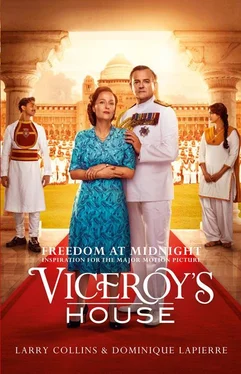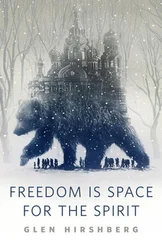The root of the problem was the age-old antagonism between India’s 300 million Hindus and 100 million Moslems. Sustained by tradition, by antipathetic religions, by economic differences, subtly exacerbated through the years by Britain’s own policy of Divide and Rule, their conflict had reached boiling point. The Moslem leaders now demanded that Britain rip apart the unity she had so painstakingly erected to give them an Islamic state of their own. The cost of denying them their state, they warned, would be the bloodiest civil war in Asian history.
Just as determined to resist their demands were the leaders of the Congress Party representing most of India’s 300 million Hindus. To them, the division of the sub-continent would be a mutilation of their historic homeland almost sacrilegious in its nature.
Britain was trapped between those two apparently irreconcilable positions, sinking slowly into a quagmire from which she seemed unable to extricate herself. Time and again British efforts to resolve the problem had failed. So desperate had the situation become, that the present Viceroy, an honest, forthright soldier, Field-Marshal Sir Archibald Wavell, had just submitted to the Attlee government his last-ditch recommendations. Should all else fail, he suggested the British announce ‘we propose to withdraw from India in our own method and in our own time and with due regard to our own interests; and that we will regard any attempt to interfere with our programme as an act of war which we will meet with all the resources at our command.’
Britain and India, Attlee told Mountbatten, were heading towards a major disaster. The situation could not be allowed to go on. Wavell was a man of painfully few words, and, Attlee said, he’d been unable to establish any real contact with his loquacious Indian interlocutors.
A fresh face, a fresh approach was desperately needed if a crisis were to be averted. Each morning, Attlee revealed, brought its batch of cables to the India Office announcing an outburst of wanton savagery in some new corner of India. It was, he indicated, Mountbatten’s solemn duty to take the post he’d been offered. *
A sense of foreboding had been filling Mountbatten as he listened to the Prime Minister’s words. He still thought India was ‘an absolutely hopeless proposition’. He liked and admired Wavell, with whom he’d often discussed India’s problems during his regular visits to Delhi as Supreme Allied Commander in South-east Asia.
Wavell had all the right ideas, Mountbatten thought. If he couldn’t do it, what’s the point of my trying to take it on? Yet he was beginning to understand there was no escape. He was going to be forced to accept a job in which the risk of failure was enormous and in which he could easily shatter the brilliant reputation he’d brought out of the war.
If Attlee was going to force it on him, however, Mountbatten was determined to impose on the Prime Minister the political conditions that would give him at least some hopes of success. His talks with Wavell had given him an idea what they were.
He would not accept, he told the Prime Minister, unless the government agreed to make an unequivocal public announcement of the precise date on which British rule in India would terminate. Only that, Mountbatten felt, would convince India’s sceptical intelligentsia that Britain was really leaving and infuse her leaders with the sense of urgency needed to get them into realistic negotiations. *
Second, he demanded something no other Viceroy had ever dreamed of asking, full powers to carry out his assignment without reference to London and, above all, without constant interference from London. The Attlee government could give the young admiral his final destination but he, and he alone, was going to set his course and run the ship along the way.
‘Surely,’ Attlee asked, ‘you’re not asking for plenipotentiary powers above His Majesty’s Government, are you?’
‘I am afraid, Sir,’ answered Mountbatten, ‘that that is exactly what I am asking. How can I possibly negotiate with the Cabinet constantly breathing down my neck?’
A stunned silence followed his words. Mountbatten watched with satisfaction as the nature of his breathtaking demand registered on the Prime Minister’s face, hoping, as he did, that it would prompt Attlee to withdraw his offer.
Instead, the Prime Minister indicated with a sigh his willingness to accept even that. An hour later, shoulders sagging, Mountbatten emerged from the portal of Downing Street. He knew he was condemned to become India’s last Viceroy, the executioner, in a sense, of his countrymen’s fondest imperial dream.
Getting back into his car, a strange thought struck him. It was exactly seventy years, almost to the hour, from the moment his own great-grandmother had been proclaimed Empress of India on a plain outside Delhi. India’s princes, assembled for the occasion, had begged the heavens that day that Queen Victoria’s ‘power and sovereignty’ might ‘remain steadfast forever’.
Now, on this New Year’s morning one of her great-grandsons had initiated the process which would fix the date on which ‘forever’ would come to an end.
History’s most grandiose accomplishments can sometimes have the most banal of origins. Great Britain was set on the road to the great colonial adventure for five miserable shillings. They represented the increase in the price of a pound of pepper proclaimed by the Dutch privateers who controlled the spice trade.
Incensed at what they considered a wholly unwarranted gesture, twenty-four merchants of the City of London gathered on the afternoon of 24 September 1599 in a decrepit building on Leadenhall Street. Their purpose was to found a modest trading firm with an initial capital of £72,000 subscribed by 125 shareholders. Only the simplest of concerns, profit, inspired their enterprise which, expanded and transformed, would ultimately become the most noteworthy creation of the age of imperialism, the British Raj.
The Company received its official sanction on 31 December 1599, when Queen Elizabeth I signed a royal charter assigning it exclusive trading rights with all countries beyond the Cape of Good Hope for an initial period of fifteen years. Eight months later, a 500-ton galleon named the Hector dropped anchor in the little port of Surat, north of Bombay. It was 24 August 1600. The British had arrived in India. Their initial landing was a modest one. It came in the solitary figure of William Hawkins, Captain of the Hector , a dour old seaman who was more pirate than explorer. Hawkins marched off into the interior, prepared to find rubies as big as pigeons’ eggs; endless stands of pepper, ginger, indigo, cinnamon; trees whose leaves were so enormous that the shade they cast could cover an entire family, potions derived from elephants’ testicles to give him eternal youth.
There was little of that India along the Captain’s march to Agra. There, however, his encounter with the great Moghul compensated for the hardships of his journey. He found himself face to face with a sovereign beside whom Queen Elizabeth appeared the ruler of a provincial hamlet. Reigning over 70 million subjects, the Emperor Jehangir was the world’s richest and most powerful monarch, the fourth and last of India’s great Moghul rulers.
The first Englishman to reach his court was greeted with a gesture which might have disconcerted the 125 worthy shareholders of the East India Trading Company. The Moghul made him a member of the Royal Household and offered him as a welcoming gift the most beautiful girl in his harem, an Armenian Christian.
Fortunately, benefits of a nature more likely to inspire his employer’s esteem than the enrichment of his sex life also grew out of Captain Hawkins’ arrival in Agra. Jehangir signed an imperial firman authorizing the East India Company to open trading depots north of Bombay. Its success was rapid and impressive. Soon, two ships a month were unloading mountains of spices, gum, sugar, raw silk and Muslin cotton on the docks along the Thames and sailing off with holds full of English manufactures. A deluge of dividends, some of them as high as 200%, came pouring down on the firm’s fortunate shareholders.
Читать дальше












